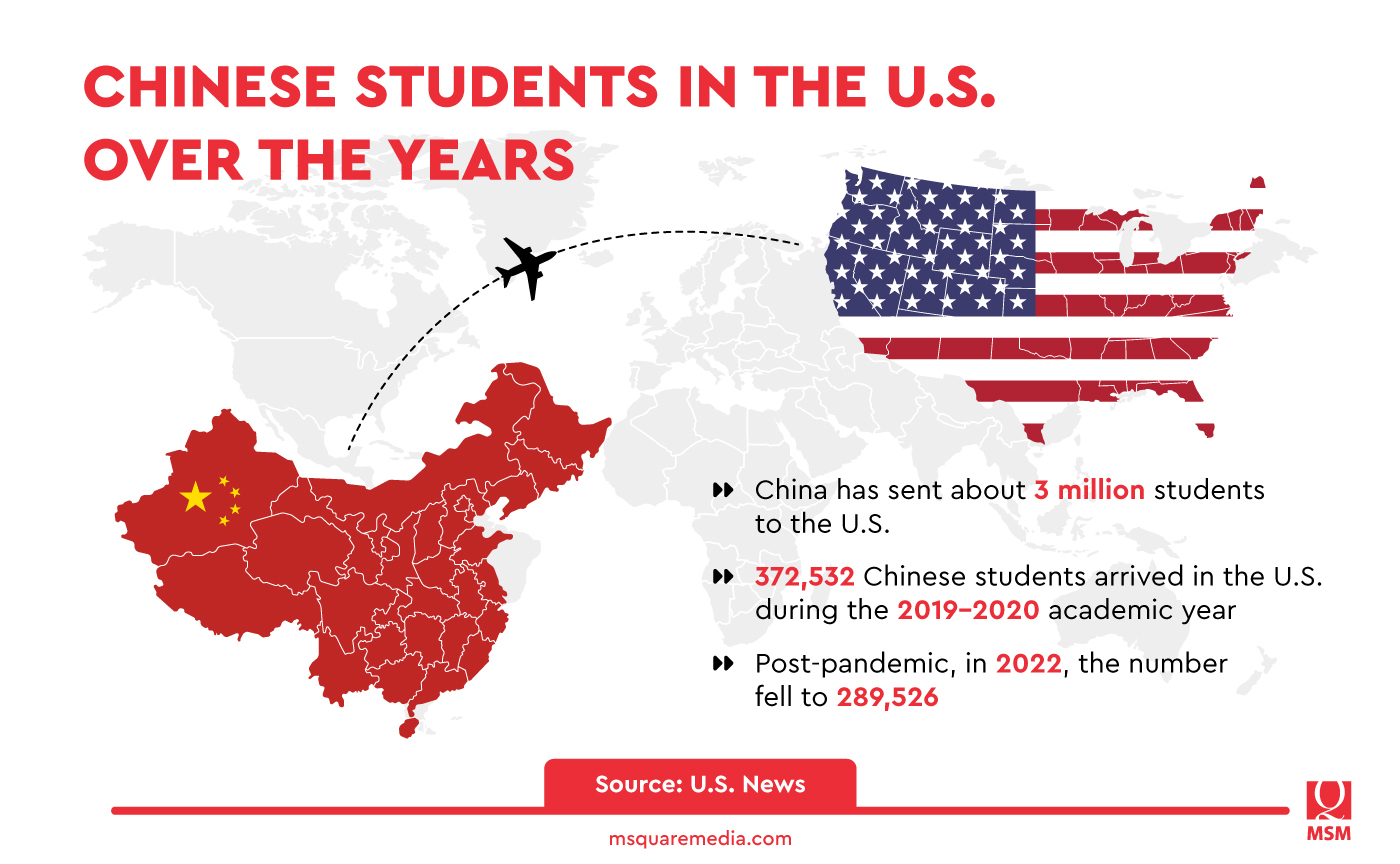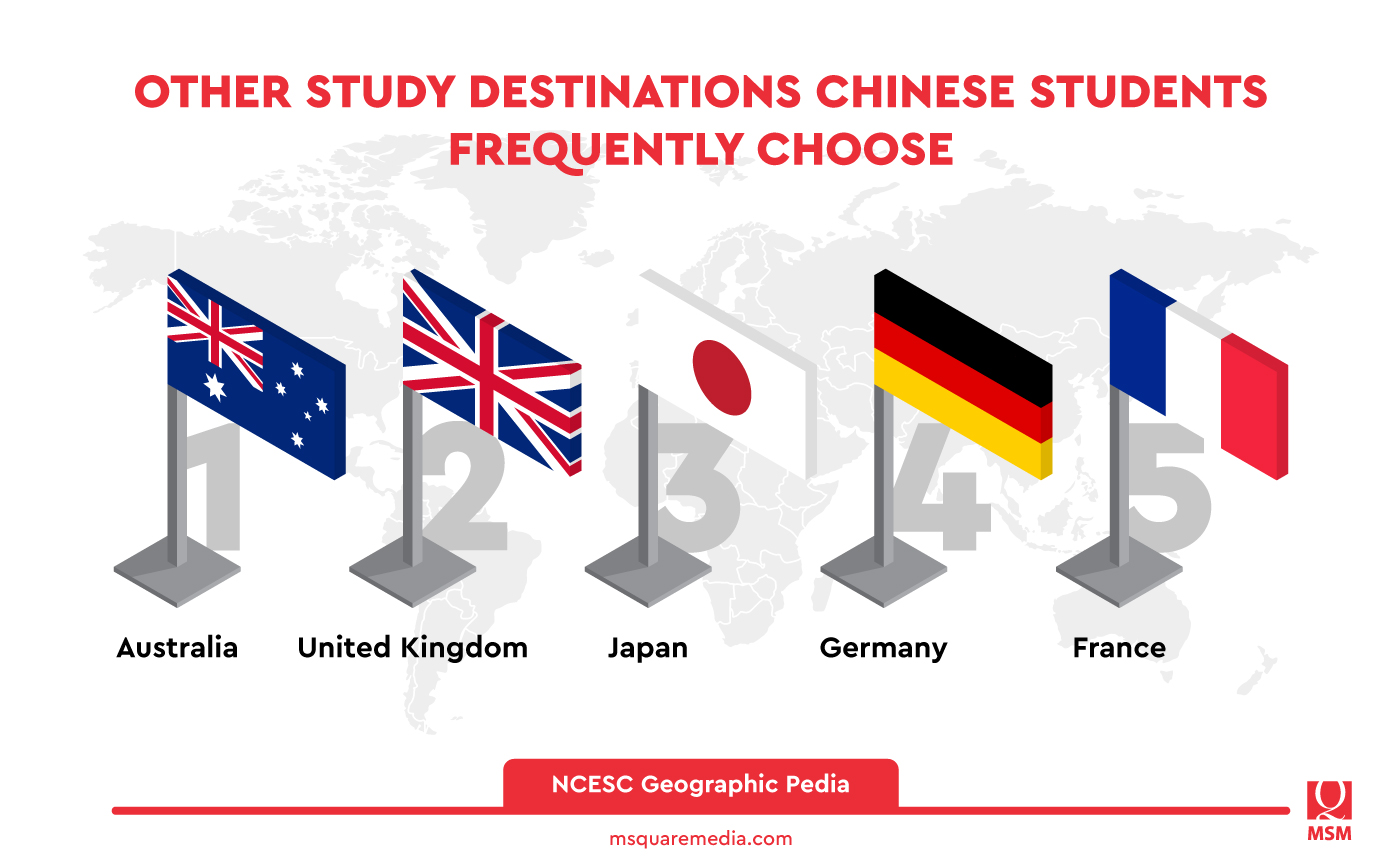Key Takeaways:
- Many Chinese students are pursuing higher education overseas, with an estimated three million doing so in the U.S. due to China’s economic expansion.
- With about 340,222 students, the U.S. is the most popular country for Chinese students to study abroad, followed in order of popularity by Australia, the United Kingdom, Japan, Germany, and France.
- Chinese international students make a substantial economic and cultural contribution to their host nations.
A recent Associated Press study projected that three million Chinese students are enrolled in higher education programs in the United States, continuing a trend of exceptional expansion. This spike indicates China’s economic growth, which has given rise to a growing middle class with the resources to send their kids to study abroad.
This increase in Chinese students studying abroad has had a significant impact on the global education scene, particularly in the US, which is still the most popular study destination for foreign learners. About 372,532 Chinese students arrived in the US during the 2019–2020 academic year, accounting for nearly one-third of all foreign students studying there.

However, when the pandemic happened, the number fell to 289,526 in 2022. U.S. News reported that the annual studies on international students published by the Institute of International Education reveal that American universities are giving preference to Indian students over Chinese students, particularly in graduate programs. The same report also revealed that 36 percent of schools in the U.S. reported increases in new Chinese students in fall 2023.
Significant numbers of Chinese students were also drawn to Australia, the UK, Japan, Germany, and France, demonstrating the allure of these locations for those seeking foreign education.
Reasons Behind the Trend
China’s emphasis on education as a vehicle for social and economic growth is one of the main forces behind this trend. Chinese parents believe that sending their kids abroad to school will provide them with a competitive advantage in the global labor market and be a wise investment in their future. The wide range of academic programs and research opportunities that international colleges and universities offer also draws Chinese students, especially in STEM (science, technology, engineering, and mathematics) disciplines.
Furthermore, many Chinese students have chosen to study abroad because they want to experience a global perspective and cultural immersion. Living and studying abroad gives students a unique perspective on various cultures and thought processes, which can expand their perspectives and improve both their personal and professional growth. As China aspires to interact with the world and contribute to global knowledge and creativity, this trend represents a larger shift in Chinese thinking towards a more global perspective.
Chinese students are also drawn to the wide variety of research possibilities and programs that institutions in the U.S. and other countries provide. They view studying overseas as a chance to expand their foreign experience and improve their chances of landing a good job later on. Chinese students are increasingly choosing to study abroad, mostly out of a desire for both professional and personal development.
Other Popular Study Abroad Destinations for Chinese Students
With around 340,222 students, the US is still the most popular destination for Chinese students studying abroad. The wide variety of curricula and research opportunities offered by American colleges, together with the opportunity for career progression, are well-known. Chinese students also appreciate American schools’ multicultural atmosphere since it gives them the chance to mingle with people from other backgrounds and broadens their worldview.
With over 155,594 students, according to an NCESC Geographic Pedia report, Australia is the second most popular country for Chinese students to study abroad. Chinese students looking to pursue an international education find the country to be an appealing location due to its diverse society, proximity to China, and excellent educational system. Similarly, a substantial number of Chinese students who wish to study abroad frequently choose the UK, Japan, Germany, and France because they provide outstanding education and a variety of study possibilities.

Moving Forward
Establishing welcoming environments and cultivating positive interactions with Chinese students studying abroad is becoming increasingly important. This tendency can greatly benefit China and the host countries by fostering cross-cultural dialogue and understanding. Host nations can facilitate students’ academic success and ease their transition to new environments by providing support services specifically designed to meet the needs of Chinese students, such as language assistance and cultural orientation programs.
Furthermore, accepting the diversity that Chinese students bring can benefit both the local society and Chinese students by fostering reciprocal learning and enrichment. They enhance the academic environment and promote innovation and knowledge exchange by bringing a variety of viewpoints, abilities, and ideas to their host nations.
China and the countries hosting not just Chinese, but all international students may jointly establish a more equitable and mutually advantageous international education environment by acknowledging the significance of this trend and cooperating to assist and integrate these students into their host communities. (RAGHWA GOPAL)

RAGHWA GOPAL
MSM CEO
Raghwa Gopal is a serial entrepreneur, academic, and software engineer by profession. Drawing from extensive business experience, Raghwa joined MSM from British Columbia’s Innovate BC, serving as president and CEO and helping companies start and scale to fuel technology development, commercialization, and adoption. As Accelerate Okanagan’s (AO) former CEO, he was a driving force in development of the tech sector, with a CA$1.6-billion economic contribution.
Raghwa studied at New Zealand’s Central Institute of Technology, Australia’s Collier MacMillan School, and the University of the South Pacific. He has strong ties to higher education as a former lecturer of business at UBC Okanagan, computer science at the School of Arts and Sciences, and entrepreneur-in-residence at Okanagan College School of Business.
His board memberships span across multiple organizations, such as the University of British Columbia, the India Canada Innovation Council, the Women’s Enterprise Centre, and the Province of British Columbia’s Emerging Economy Task Force.
Sources:
- After the pandemic, young Chinese again want to study abroad, just not so much in the US. (2024, March 16). U.S. News. Retrieved from https://www.usnews.com/news/world/articles/2024-03-16/after-the-pandemic-young-chinese-again-want-to-study-abroad-just-not-so-much-in-the-us
- Forbes, E. (2024, March 25). Which country has the most Chinese students? NCESC Geographic Pedia. Retrieved from https://www.ncesc.com/geographic-pedia/which-country-has-the-most-chinese-students/

